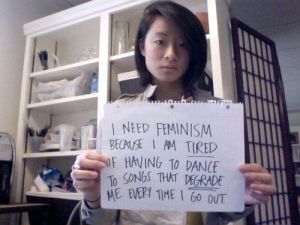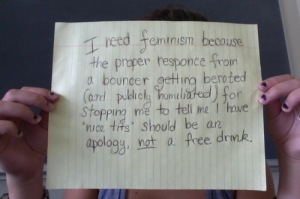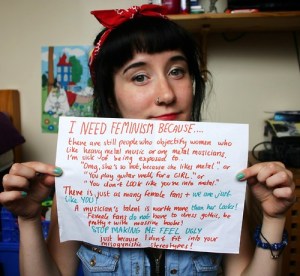I look back on music I loved when I was in highschool and I cringe like hell. Mariana’s Trench, The Fratellis, Cobra Starship, even Fall Out Boy. Their music was catchy and made me feel lots of things and was generally pretty decent. The songs I still remember the words to, even now.
I almost have the attitude that, well, if I didn’t know the songs were sexist or misogynist back then, maybe neither did they. Wanting to forgive so I can still enjoy. I am so disappointed when I listen to songs that I love (in a nostalgic way…) and can barely justify the way I used to think.
I am better disciplined now. If music I hear sounds like the singer judges women, objectifies women, hates women, or has unrealistic expectations of women (that last one is somewhat flexible, and I don’t know how to feel about Cake’s Short Skirt Long Jacket because, frankly, it’s just a bit confusing with that deadpan, melody-free voice he’s got) I generally can’t listen to it.
When I’m in clubs (on my biannual visits), I know I just have to deal with it. I make mental notes of how much I’m not enjoying myself, and that I probably just shouldn’t come back, but I know I can’t change it.
I try to avoid criticizing friends’ choices of music because it’s one of those “pick your battles” kind of situations, and I’d rather keep my friends than feel morally superior for ten minutes.
But when it comes to music I choose to listen to, I am selective like crazy. I know there is a popular way of dealing with skeazy music, which is generally to “compartmentalise” as Ann Friedman writes about in her article, Blurring the Lines: How to Enjoy Maybe-Sexist Music, but I am unable to abide.
I am so angry at Thicke and West and Timberlake for their disrespect, laziness and unoriginality, that I can’t even WANT to listen as a guilty pleasure. It would be too guilty and not even close to pleasurable enough to bother forcing.
What do you think? How do you justify listening to music with an iffy moral message?
 We need feminism because there is no such thing as ‘Blurred Lines’, no means no.
We need feminism because there is no such thing as ‘Blurred Lines’, no means no.






